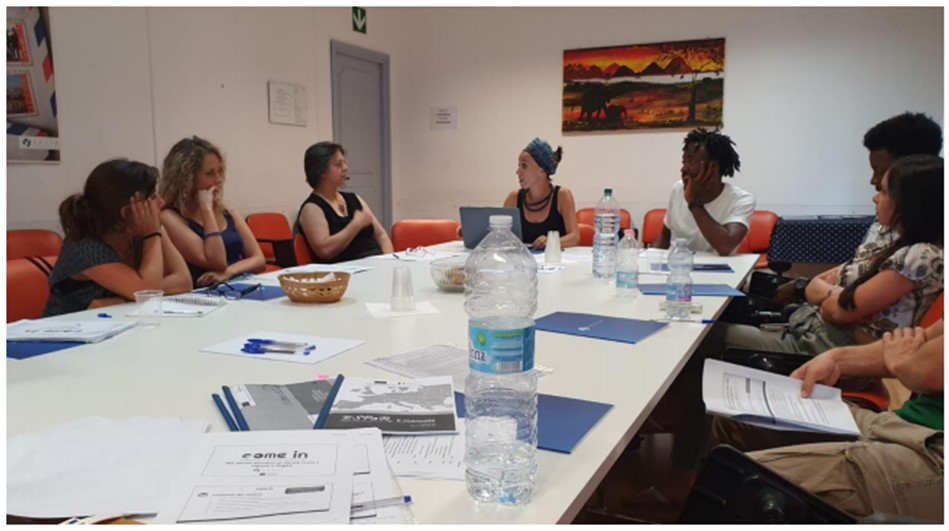 Al Revès is a social cooperative from Palermo, Italy that runs a tailoring laboratory and vintage shop “Sartoria Sociale” where respect for the environment and the people are the core values and where creativity is without borders. Indeed, the diversity, mixture and union of Italian and African styles results in original designs often made of recycled materials.
Al Revès is a social cooperative from Palermo, Italy that runs a tailoring laboratory and vintage shop “Sartoria Sociale” where respect for the environment and the people are the core values and where creativity is without borders. Indeed, the diversity, mixture and union of Italian and African styles results in original designs often made of recycled materials.
Sartoria Sociale, a social tailoring laboratory and shop established by Al Revès in 2012, offers an internship opportunity to young refugees and migrants who have professional or educational background in tailoring and dress-making. From the beginning of the collaboration, interns are accompanied by a senior tailor who assesses their actual competences and teaches them necessary tailoring techniques. During the process of on-boarding, managers and trainers try to mediate cultural and religious differences influencing the work performance and team interactions. Typically, they deal with time management, working habits, different ways of tailoring and language barrier using mainly the strategies of informal mentoring. Sartoria Sociale also employs social workers who strongly supports both labour and social integration of interns and employees with migration background. They also take care of their interns’ professional development and career path. At the completion of an internship, the interns can be offered a permanent job or are provided with individual counselling on their next education or employment possibilities.
Representatives of Al Revès and Sartoria Sociale participated in the COME IN Training attending the piloting sessions dedicated to 3 modules. The Module 1: Refugees’ background and legal aspects was evaluated as very useful and up-to-date. It was found valuable especially because all the recent updates on residence and work permits were presented and discussed along the legal measures of refugees’/migrants’ employment. Going beyond the COME IN training content, Al Revès expressed strong interest in the self-employment possibilities for migrants. Some of the tailors working at Sartoria Sociale have ambition to become freelancers, create and sell their own designs and the Cooperative is supporting the realisation of their dream. To support professional and personal growth of these employees, CESIE developed an additional material explaining and summarizing information on self-employment possibilities including the documents and other pre-requisitions needed which can be used by all social workers, mentors and migrants.
A social worker from Al Revès also took part in the piloting of Module 2: Competence assessment and Module 3: On-the-job training. These modules were appreciated because the cooperative offers also services of individual counselling, career orientation, job shadowing and occupational rehabilitation supported by professional tutors.
The content of the COME IN training materials covers topics highly relevant to the activities of the cooperative, e.g. initial evaluation of competences and evaluation of competence development in non-formal environment including techniques of autobiographical narration and the STAR method which Sartoria Sociale can use during the recruitment and selection process.
Considering the Module 3, this employer can strongly benefit from the training materials dedicated to mentoring and demonstration OJT method. All interns have to go through an initial training focused on occupational orientation, work execution and social inclusion. The OJT techniques and methods presented during the training are therefore highly useful in case of the cooperative. Furthermore, the demonstration is an ideal technique for teaching practical manual skills such as sawing or needlework.
A social worker from Sartoria found very useful all the training materials dealing with cultural differences, intercultural mediation and diversity management. As she shared, they often work with migrants who might have difficulties to interact with local colleagues and are at risk of being excluded from the team. In these cases, social workers need great professional and interpersonal competences to help the interns not only with labour integration, but also with social integration.
Participation of Al Revès in the COME IN project was advantageous also for the other participants and CESIE staff for their rich experience and original ideas they shared during the meeting. Participants had the opportunity to learn from each other, broaden their horizons and make new contacts. Sartoria Sociale as an employer met with local asylum centres supporting refugees and migrants in the research of an occupation. Some of the asylum centres were interested in exploring the opportunities of future collaboration and presenting their clients to Sartoria as possible interns. This can support the future job matching between migrants and employers.
Website of Sartoria Sociale: https://www.sartoriasociale.com/

 Al Revès is a social cooperative from Palermo, Italy that runs a tailoring laboratory and vintage shop “Sartoria Sociale” where respect for the environment and the people are the core values and where creativity is without borders. Indeed, the diversity, mixture and union of Italian and African styles results in original designs often made of recycled materials.
Al Revès is a social cooperative from Palermo, Italy that runs a tailoring laboratory and vintage shop “Sartoria Sociale” where respect for the environment and the people are the core values and where creativity is without borders. Indeed, the diversity, mixture and union of Italian and African styles results in original designs often made of recycled materials.